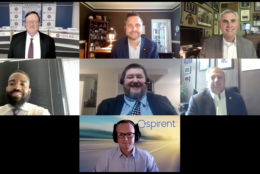SDFM The Business of Defense
-
In addition to being a wireless carrier that millions rely on to access the internet and make phone calls, Verizon is a security leader that strives to meet the needs of public safety agencies across the United States.
May 24, 2022 -
Agencies have an opportunity to reduce costs and improve citizen services by moving away from paper forms.
May 24, 2022 -
In security, compliance is like getting a spare in bowling. It’s close but still not a complete knockdown strike. To achieve a “perfect game,” federal agencies need solutions that move them from mobile device management to mobile device security.
May 24, 2022 -
Explore what the future of 5G in government means to you during this webinar on Wednesday, June 1st at 1 p.m.
May 20, 2022 -
This week’s FEDtalk show spotlights the Department of Justice’s post-pandemic reentry plans. As DOJ strives to reach a “new normal,” groups representing Department attorneys discuss how telework availability is impacting employee morale, recruitment, and retention.
May 20, 2022 -
Jeff Schramek, the deputy commissioner for fiscal accounting and shared services at the Bureau of Fiscal Service in the Treasury Department, said taking a human centered design approach to improving its shared services offerings.
May 19, 2022 -
If agencies can overcome cultural resistance and learn to trust and fully leverage cloud solutions, they’ll reap the benefits of scalability, flexibility, specialized security expertise, and an improved user experience.
May 19, 2022 -
In the never-ending work of information technology modernization, federal agencies have been working on three tracks when it comes to cloud computing. They’ve moved at least some legacy applications to the cloud in what’s commonly called lift-and-shift.
May 19, 2022 -
Join us as Coderre answers questions from hosts Mark Masselli and Margaret Flinter about SAMHSA’s mission to reduce the impact of substance use disorder and mental illness on America's communities.
May 19, 2022 -
The pandemic we have been experiencing over the last few years has begun to evolve in ways that we have all noticed. Communities are now considering how best to navigate life with endemic COVID-19.
May 18, 2022 -
Digital engineering has become an important strategy in the defense domain for a faster, more efficient route to new platforms and systems. By constructing digital representations of a system that includes all the characteristics it would have as a physical entity, digital engineering saves much of the costs and time required to build and test physical prototypes.
May 17, 2022 -
The U.S. Army is called upon to help the nation not only because it has warfighting responsibilities, but also because it has vast resources and capabilities that can be utilized to assist local authorities when a disaster hits.
May 17, 2022 -
Two things the federal government is looking at for its data center strategy going forward are better locations and greener technologies.
May 16, 2022 -
Agencies face a major year-end deadline to phase out paper as part of their records management procedures.
May 16, 2022 -
During 42 years working in the Army, Larry David Leiby tested critical weapons systems, including the Patriot missile system and Apache attack helicopter. Learn about him now during Federal News Network’s May We Say Thank You event.
May 16, 2022















